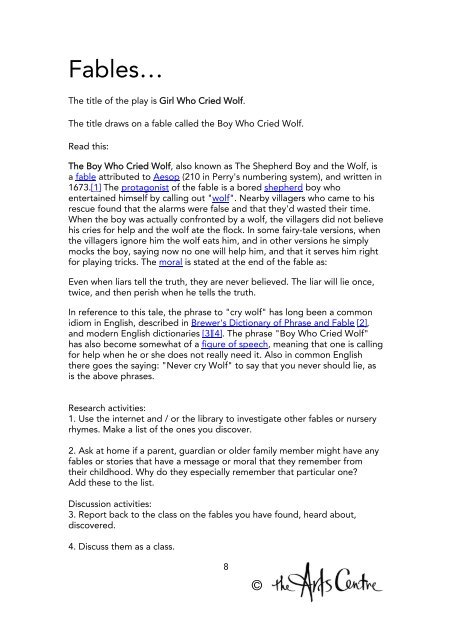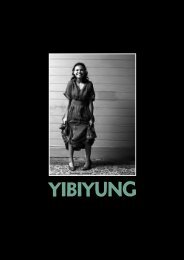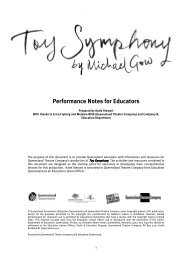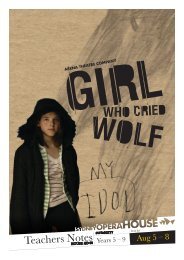EDUCATION KIT: Girl Who Cried Wolf - AustralianPlays.org
EDUCATION KIT: Girl Who Cried Wolf - AustralianPlays.org
EDUCATION KIT: Girl Who Cried Wolf - AustralianPlays.org
Create successful ePaper yourself
Turn your PDF publications into a flip-book with our unique Google optimized e-Paper software.
Fables…<br />
The title of the play is <strong>Girl</strong> <strong>Who</strong> <strong>Cried</strong> <strong>Wolf</strong>.<br />
The title draws on a fable called the Boy <strong>Who</strong> <strong>Cried</strong> <strong>Wolf</strong>.<br />
Read this:<br />
The Boy <strong>Who</strong> <strong>Cried</strong> <strong>Wolf</strong>, also known as The Shepherd Boy and the <strong>Wolf</strong>, is<br />
a fable attributed to Aesop (210 in Perry's numbering system), and written in<br />
1673.[1] The protagonist of the fable is a bored shepherd boy who<br />
entertained himself by calling out "wolf". Nearby villagers who came to his<br />
rescue found that the alarms were false and that they'd wasted their time.<br />
When the boy was actually confronted by a wolf, the villagers did not believe<br />
his cries for help and the wolf ate the flock. In some fairy-tale versions, when<br />
the villagers ignore him the wolf eats him, and in other versions he simply<br />
mocks the boy, saying now no one will help him, and that it serves him right<br />
for playing tricks. The moral is stated at the end of the fable as:<br />
Even when liars tell the truth, they are never believed. The liar will lie once,<br />
twice, and then perish when he tells the truth.<br />
In reference to this tale, the phrase to "cry wolf" has long been a common<br />
idiom in English, described in Brewer's Dictionary of Phrase and Fable [2],<br />
and modern English dictionaries [3][4]. The phrase "Boy <strong>Who</strong> <strong>Cried</strong> <strong>Wolf</strong>"<br />
has also become somewhat of a figure of speech, meaning that one is calling<br />
for help when he or she does not really need it. Also in common English<br />
there goes the saying: "Never cry <strong>Wolf</strong>" to say that you never should lie, as<br />
is the above phrases.<br />
Research activities:<br />
1. Use the internet and / or the library to investigate other fables or nursery<br />
rhymes. Make a list of the ones you discover.<br />
2. Ask at home if a parent, guardian or older family member might have any<br />
fables or stories that have a message or moral that they remember from<br />
their childhood. Why do they especially remember that particular one?<br />
Add these to the list.<br />
Discussion activities:<br />
3. Report back to the class on the fables you have found, heard about,<br />
discovered.<br />
4. Discuss them as a class.<br />
8<br />
©








